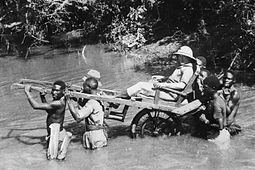
Correlated Facts, Science, and
Observations of Life

An Actionable DEI Insight ...
Colonial Mindset
Summary
A Colonial Mindset is the assertion of notions of cultural inferiority and superiority are inherited and practiced by dominant cultures relating to its non-dominant cultures.
It is used to maintain and spread stereotypes and fears of the future by established so call "norms" and social hierarchies.

The colonial mindset can be the basis of various forms of nationalism and social ranking based on place of birth, political affiliation, colorism, religion, and other forms of prejudice.
It forms a foundation of demonization that can have a range of potentially "socially accepted" outcomes:
- From getting a country involved in an unjust war so its leaders maintain political power,
- To maintaining inequitable institutions that are bureaucratically or para-militarily empowered to "maintain order,"
- To implicitly and/or explicitly use, in effect, use "psychological operations" to establish a social order that serves a selective portion of a society's population.
Its fallacies are exposed with a concerned and accurately informed population in an information age that is presented with many different historical perspectives.
Colonial mindsets are increasingly being discredited as the free flow of information and globalization offers opportunities for ALL people to reach their full human potential.
The Impact on Culture
The colonial mindset remains relevant in contemporary discussions on diversity and equity in several ways:
- Structural Inequality: Many societies today still grapple with structural inequalities that have roots in colonialism. Economic disparities, access to resources, and opportunities are often skewed along lines of historical exploitation and domination.
- Cultural Hegemony: The dominance of certain cultural norms, values, and practices can marginalize or suppress diverse cultural expressions and identities. This echoes colonial efforts to impose cultural assimilation and erase indigenous knowledge and practices.
- Power Dynamics: Discussions around equity often involve power dynamics where historically privileged groups (often remnants of former colonial powers or dominant cultures) may resist efforts to level the playing field, maintaining a status quo that perpetuates inequalities.
- Representation and Recognition: Issues of representation in media, governance, and education reflect ongoing struggles to dismantle colonial legacies that favored the perspectives and narratives of the colonizers while marginalizing indigenous or minority voices.
- Development and Resources: Global economic systems still reflect patterns of exploitation and extraction that originated during colonial times, affecting the distribution of wealth, technology, and development opportunities.

Addressing the colonial mindset in contemporary dialogues requires recognizing historical injustices, promoting inclusive policies, amplifying marginalized voices, and fostering genuine respect for cultural diversity.
It involves challenging ingrained biases and rethinking systems to ensure equitable opportunities and outcomes for all individuals and communities, irrespective of their cultural background or historical legacy.
Links for more detail ...
Each link will open in a new window
Colonial Mentality (Wikipedia)
Colonial Psychology: The Psychology We All Recognize | Psychology Today
50 Possible Signs You May Have Colonial Mentality | Thought Catalog
Can we free ourselves from the colonial mindset? - New African Magazine
For Indigenous nations to live, colonial mentalities must die (irpp.org)